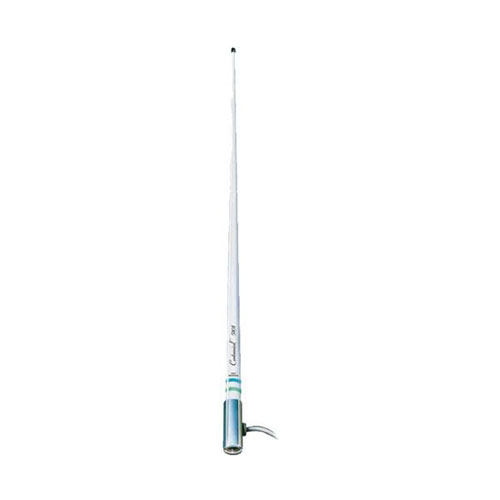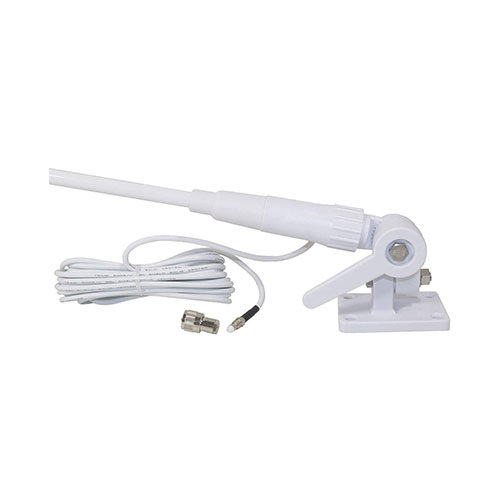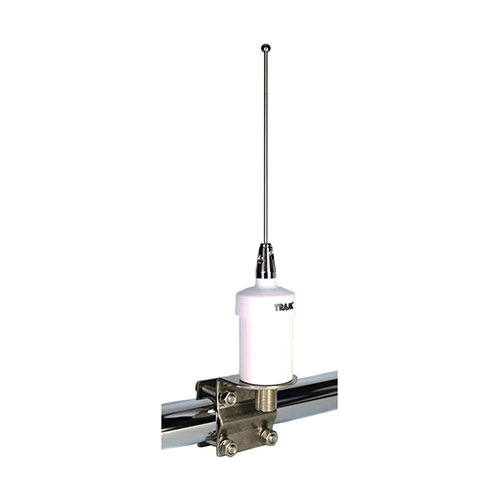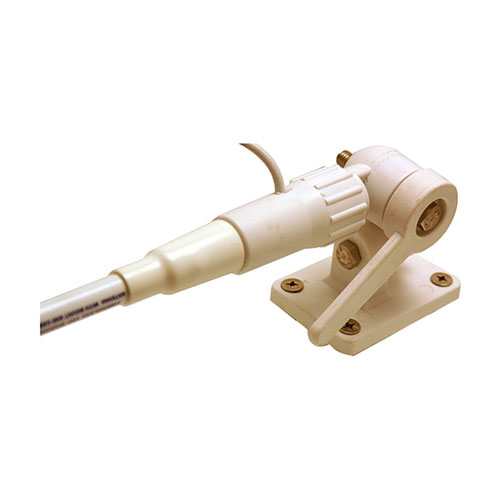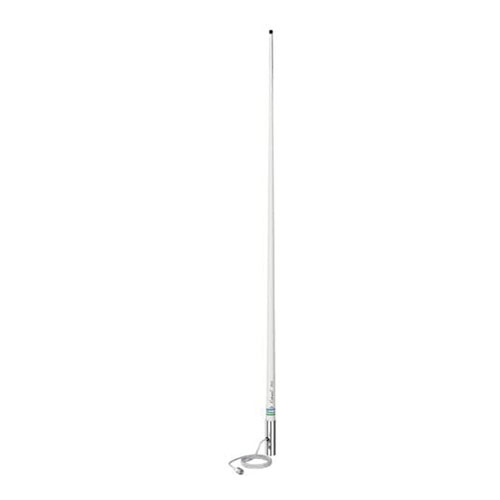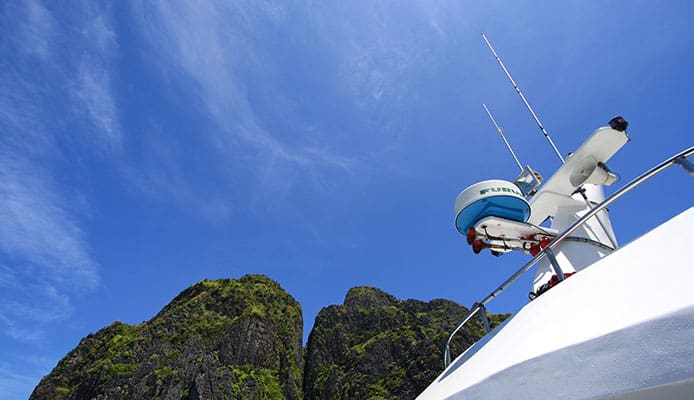
If you own a boat, probably you have already invested in a marine VHF radio that can be used for communication and emergencies. You can even interrupt marine stereos to deliver important announcements. Marine radios allow you to stay connected on your boat, but even the best radio can use some support. If you want to ensure your marine VHF radio has a reliable connection, you should invest in a top-rated marine VHF antenna.
All radios need an antenna to function, but the best marine VHF antenna will have your radio functioning at full power with the signals transmitted in the correct direction and with the best quality possible. It can be overwhelming to choose the best VHF antenna and if you don’t know what features to consider before making a purchase, you can be left disappointed with the antenna’s performance.
That’s why we have made a list of the best marine VHF antennas on the market and included a guide on how to determine what makes a high-quality antenna. It will help you choose one and ensure your boat is ready for the next adventure.
OUR TOP PICK
Shakespeare Centennial White 8′
- Stand Out Features - Why We Love It
- Made to deliver clean and clear audio
- Chrome-plated brass ferrule
- Long-lasting and durable
- Brass and copper elements
- Great connection provided
Product Dimensions: 96 x 3 x 3 inches
Weight: 3 pounds
EDITORS CHOICE
Tram 46-Inch
- Stand Out Features - Why We Love It
- 3 DBD Gain
- Heavy-duty fiberglass construction
- Nylon ratchet mount for easy laydown
- Stainless Steel Hardware
- Extra durable and long-lasting
Product Dimensions: 51 x 5.2 x 2.5 inches
Weight: 2 pounds
BEST VALUE
Tram VHF Antenna
- Stand Out Features - Why We Love It
- Fiberglass
- Stainless steel hardware
- Nylon ratchet mount
- Easy lay down construction
- Featuring a connector
Product Dimensions: 51 x 5.2 x 2.5 inches
Weight: 2 pounds
Wholesale Parts Tram 5 Ft
- Stand Out Features - Why We Love It
- Suitable for marine use
- Stainless steel hardware
- Can cover all marine band frequencies
- Coaxial cable included
- Heavy-duty fiberglass construction
Product Dimensions: 66.5 x 5.8 x 4.2 inches
Item Weight: 2.16 pounds
Shakespeare 4′ Centennial
- Stand Out Features - Why We Love It
- Great connecting features
- Stainless steel hardware
- 15 ft. 8 inches long cable
- Trusted brand
- Made with high-quality materials
Product Dimensions: 55 x 3 x 3 inches
Item Weight: 2.1 pounds
How To Choose A Marine VHF Antenna – Buying Guide
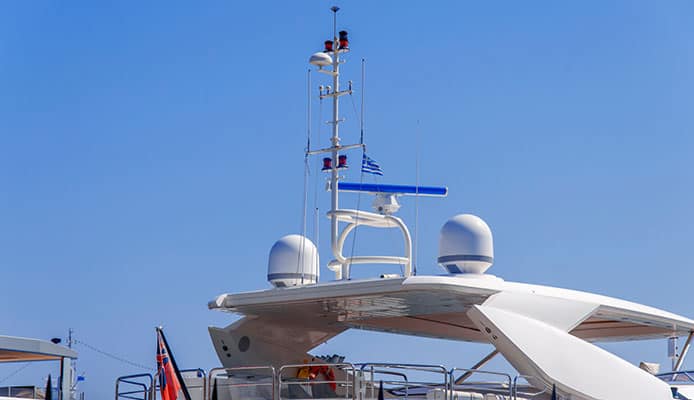
Antenna’s Construction
You should spend the time to find the best antenna for your needs and ensure that it has high-quality features to deliver strong and reliable performance. One of the main things to consider along the search is the marine band antenna construction.
Usually, the most expensive designs will be ready to deliver the most amazing performance. You should try to invest in high-quality construction because it will be made of quality materials and will last longer.
Some of the best options are made of metal in a fiberglass coating. Others are made of chrome-plated brass elements. The ones that come at their lowest quality are made of the plastic ferrule, which won’t do a great job or last as long.
Range Provided
The range of the antenna determines how far away the signals from your radio can be sent. The best VHF boat antenna will ensure that your signals are being sent far away without complications. All marine band antennas should tell you their range, which can help you determine if they will suit your needs. The way that you mount your antenna can also affect the range of the signals sent. The higher the antenna is mounted, the farther it can reach. If you are using a sailboat antenna, the higher you can mount the device (for example, the top of the mast), the larger the range will be.
Device’s Gain
The gain is also called the dB rating and it is an indication of how the antenna focuses its energy. The type of boat or vessel that you have will also determine your gain and the attention you should consider. Higher rated designs will have a stronger transmission but won’t be able to send the signal as far horizontally. Lower dB antennas will have a broader pattern of radiation, which may get your signal to more places and be helpful in certain situations. Lower dB is mostly recommended when you require a sailboat antenna.
Decibel Rating
This is in correlation with the gain. The decibel rating will determine how far out your signals can be sent. Higher dB ratings tend to have a stronger transmission, but they will lose the ability to transmit horizontally. Lower dB ratings are broader, but the signal may not reach as far. Lower dB ratings also work better with transmitting signals along choppy water and rolling waves.
Antenna’s Durability
Any VHF marine radio antenna should be extremely durable. You want a design that is durable because it will last for a longer amount of time, deliver a stronger and more reliable performance, and be made of materials that can withstand the harsh ocean elements. The best VHF marine antenna will be durable enough to withstand salt, water, and sun. It should still function properly without complications even after a few years of use.
Device’s Design
Most marine band antennas are very compact in design. The main difference between designs and brands seems to be the height of the antenna. Some antenna designs are rather tall and skinny, much like you would expect an antenna to be. Other designs are stouter and shorter, which makes them have a lower profile. Other designs include a digital antenna, which ensures that all signals are correctly broadcasted.
You might also like: VHF Marine Radios
Height and Range
The height of the antenna will determine the range of sound that your antenna can pick up. A higher antenna will be able to receive an original transmission better because it will rest above a lot of obstacles. This means there are fewer obstacles to get in the way of the signal as it reaches your antenna.
All antennas should be mounted at the highest possible location on your boat or vessel, which can help ensure that it receives the right signal. The longer the design of your antenna is and the higher it is mounted, the clearer the transmission will be.
However, taller boats act as a radio tower, placing the antenna high up in the air, so the antenna itself doesn’t need to be that long. Very large power boats with tuna towers and flying bridges are very tall, and most any antenna will function very well because it is mounted high above the water. Sailboats, with their tall masts, also provide an excellent mounting position for VHF antennas: the top of the mast. Sailboat antennas can be shorter in design if they are mounted at the proper height. On the other hand, a short and compact boat would need an antenna that is tall in its design.
Cable Loss
Cable loss dictates that for every foot of cable used, the signal strength is lost. The cable that is shorter in length, about 10-20 feet, should not have any problems. However, cables that are 100 feet on a small boat, like a sailboat, can cause problems. In this situation, you could lose up to 80% of your signal.
You should keep your cables as short as possible and use the largest diameter possible. Though, cables will add weight to your boat or vessel. With this in mind, you should be sure that you’ve accounted for the weight of the VHF boat antenna system and its cables in correlation to your boat and its size.
Mount Included
This will be dependent on the brand. Not all marine VHF antennas will be sold with the same accessories. You can check the marine antennas before you purchase on the box, website, or brand information, which comes with your antenna. Brands should include whether a mounting kit is included with the purchase or needs to be purchased separately.
FAQs
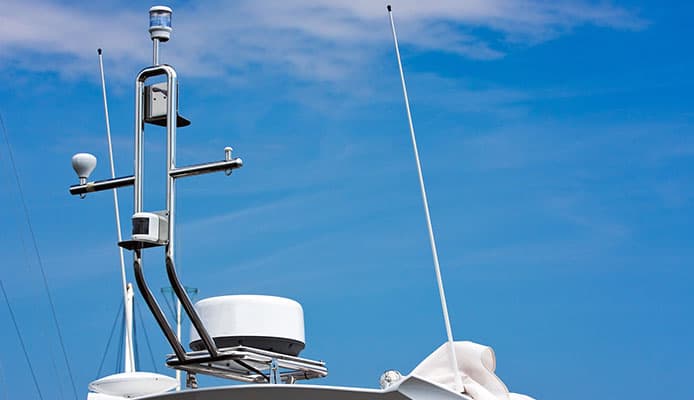
Q: What are the benefits of a VHF antenna?
All radios need one to function. The best VHF marine antenna will help boost the signals of your radio, sending them further out, and with fewer disruptions. It will boost your radio signals, even over rough water, to ensure that your message is received. VHF antennas are used to keep you connected to the outside world when you are out on the water and if you need to call for help, it may be the only way you are heard in a storm.
Q: How to mount a VHF antenna?
As stated, you should mount it at the highest point possible. However, you can attach it to a rail or use a flange mount to lock it in place on a vertical or horizontal location. Some can even be ratcheted onto a sloping surface. If you have a sailboat, the right place to mount the device would be on the mast. You should keep it away from other antennas and it should be kept a minimum of three feet from your VHF radio.
You will have to determine before you purchase whether a mounting kit is included with the purchase. If it is not, the same brand or manufacturer should have a mounting kit available for separate purchase.
Q: Is a VHF antenna necessary?
No, but it certainly helps. A marine radio should have a small one built into its design, but the distance of its antenna is significantly smaller than that of a VHF option. Installing one may not be necessary, but it should be. A marine radio’s antenna is not strong enough to transmit signals far distances and may not be reliable in choppy waves or rough weather.
It will boost your signal further out and connect you to the land and other vessels. It’s safer to have one and it can be extremely helpful in emergencies.
You must understand that everything on your boat from the marine GPS systems to your radio and antenna, will function off of marine batteries, which should be installed in your boat. For extra protection, consider investing in marine battery boxes and marine battery chargers to keep you safe, even in emergencies. All You Need to Know About Boating Safety is also a great resource before you hit the water.
Globo Surf Overview
When it comes to your marine VHF antenna, you want durability and reliability. The best VHF marine antenna will have your messages sent far and wide, ensuring that you are always able to communicate for help or assistance. A VHF antenna is a great investment to pair with your VHF radio and will have you confidently cruising the seas. If you know what you are looking for, you can save time and money by finding the perfect marine VHF antenna for your boat!



